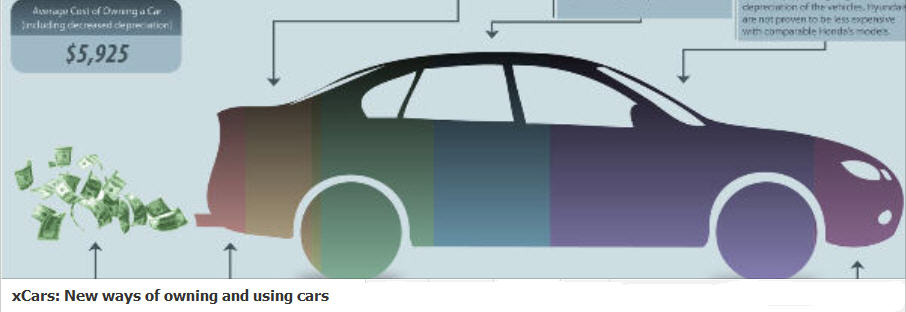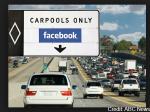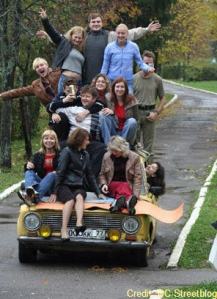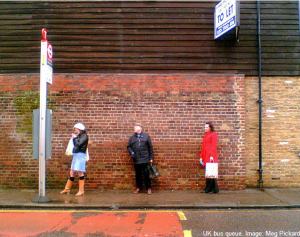 - - > Check it out at https://www.facebook.com/groups/worldcarshare/
- - > Check it out at https://www.facebook.com/groups/worldcarshare/
--> Read on:
Insights and contributions from leading thinkers & practitioners around the world
 This excellent review of ridesharing history, practices, trends and issues in North America was recently presented by its author, Susan Shaheen of the University of California, Berkeley, to a Webinar organised by the Ridesharing Institute. You may want to give particular attention to her last two pages which are more forward looking: Key Questions from Workshop and Factors to Consider.
This excellent review of ridesharing history, practices, trends and issues in North America was recently presented by its author, Susan Shaheen of the University of California, Berkeley, to a Webinar organised by the Ridesharing Institute. You may want to give particular attention to her last two pages which are more forward looking: Key Questions from Workshop and Factors to Consider.
 We have of late not been giving the necessary attention due to the thousand blossoms of ridesharing, an absolute essential ingredient in the New Mobility Mix of services for our cities, and countryside. To start to make up for this embarrassing lapse, here is the text of an editorial from last week's New Zealand Herald in Auckland New Zealand.
We have of late not been giving the necessary attention due to the thousand blossoms of ridesharing, an absolute essential ingredient in the New Mobility Mix of services for our cities, and countryside. To start to make up for this embarrassing lapse, here is the text of an editorial from last week's New Zealand Herald in Auckland New Zealand.
 In yesterday's feature which was intended to inform the exchanges at this week's TRB session concerning the eventual creation of a continuing program to support and expand ridesharing as a central sustainable transport policy, the point is made that the project should concentrate whatever resources it can stump up on ridesharing, as opposed to traditional public transport which has its own institutional and support system (for better or worse) while ridesharing from a policy and institutional perspective is still an orphan. But Simon Norton begs to differ:
In yesterday's feature which was intended to inform the exchanges at this week's TRB session concerning the eventual creation of a continuing program to support and expand ridesharing as a central sustainable transport policy, the point is made that the project should concentrate whatever resources it can stump up on ridesharing, as opposed to traditional public transport which has its own institutional and support system (for better or worse) while ridesharing from a policy and institutional perspective is still an orphan. But Simon Norton begs to differ:
Dear Paul, Susan, and other TRB friends having a look at this proposal this afternoon in DC. This is an excellent first-cut proposal and food for thought on a very important policy topic - - and I want to get firmly behind the basic concept right now.
- and I want to get firmly behind the basic concept right now.
I wish I could be with you for these important discussions because like at least half of you in this audience I am firmly convinced in the potential for ridesharing in its many diverse forms as a vital and critical means in the process of moving from unsustainable to sustainable transportation. [I am sure that much of what you find here is well known to most of you. But here I am at my desk in Paris and I want to share my best thoughts with you on this. So off we go.]
Long before automobiles and even science humankind discovered sharing tools, housing,  roads, and wharfs, a natural way to reduce scarce labour and materials. And long before Adam Smith, we used the “profit” from such sharing to develop specialized skills and knowledge, both of which required sharing, and to build shared infrastructure. Now that we face rising prices for resources, thanks to looming shortages and better understanding of “externalities,” we need to face the prospect of putting on the brakes of our rush to individual consumption. Do we do without or do we share in ways that increase, rather than, reduce, our quality of life?
roads, and wharfs, a natural way to reduce scarce labour and materials. And long before Adam Smith, we used the “profit” from such sharing to develop specialized skills and knowledge, both of which required sharing, and to build shared infrastructure. Now that we face rising prices for resources, thanks to looming shortages and better understanding of “externalities,” we need to face the prospect of putting on the brakes of our rush to individual consumption. Do we do without or do we share in ways that increase, rather than, reduce, our quality of life?
Rory McMullan, Project Administrator of this year's Kaohsiung conference, is one o f the keynote speakers in the session which is reporting on ride/sharing as a tool for affordable and fair sustainable transport in and around our cities world-wide. In this presentation he undertakes to introduce a range of employer share/transport services for larger pubic sector and industrial employers in Taiwan.
f the keynote speakers in the session which is reporting on ride/sharing as a tool for affordable and fair sustainable transport in and around our cities world-wide. In this presentation he undertakes to introduce a range of employer share/transport services for larger pubic sector and industrial employers in Taiwan.
When I was at university the only way I could afford to get home was to share a  car with someone. I set up a notice board in the student union to help me find a lift home. The notice board quickly became popular and every weekend there were lots of people offering and seeking lifts.
car with someone. I set up a notice board in the student union to help me find a lift home. The notice board quickly became popular and every weekend there were lots of people offering and seeking lifts.
 As I sat in traffic on Auckland's North-Western motorway, all alone in my cocoon, I could see that others were doing the same. Looking across, I could see each person, alone in their car, and I wondered if they might be heading to the same place as me?
As I sat in traffic on Auckland's North-Western motorway, all alone in my cocoon, I could see that others were doing the same. Looking across, I could see each person, alone in their car, and I wondered if they might be heading to the same place as me?
 Recently the city of Philadelphia, experienced a six day long strike by the local transit authority, SEPTA. Subways and buses stopped operating only hours before the Monday morning rush hour leaving workers scrambling for alternative modes of transportation to get to the office.
Recently the city of Philadelphia, experienced a six day long strike by the local transit authority, SEPTA. Subways and buses stopped operating only hours before the Monday morning rush hour leaving workers scrambling for alternative modes of transportation to get to the office.
- Submitted by Timothy Ericson, CityRyde, Philidelphia, PA USA
The strike also left many school aged children stranded and unable to attend classes. Even non-transit riders were frustrated with huge increases in vehicular traffic on all of the city’s roads and hiways. During the strike period, bicycle ridership skyrocketed in Philadelphia as it was the only option for many commuters to reach their destinations. The strike forced many residents to view the bicycle as a primary form of transportation.
Paris, France had a similar scenario back in October of 2007 when their transit workers went on strike. However Paris commuters had an option that Philadelphia commuters did not, they have a bike sharing system. Vélib’, one of the largest bike sharing systems in the world, experienced a tremendous increased in ridership during this strike. According to a New York Times article, Vélib’ trips almost doubled to 175,000 trips a day, and this was still before the system was completely installed throughout the city. City officials even installed temporary stations throughout the city to try and curb the demand. Although many Parisians complained that bicycles were not available, they were lucky to have a bike sharing system available to them when the city was paralyzed.
During Philadelphia’s transit strike CityRyde had the opportunity to demonstrate to city commuters a fully functional bike sharing system during the Bicycle Coalition of Greater Philadelphia’s “Bike the Strike” event. (CityRyde would like to send a special thank you to all of the staff members of the Coalition who put together the event and allowed CityRyde to demonstrate along side them.) CityRyde’s CEO and co-founder was quoted in a Philadelphia Inquirer article saying, “Bike sharing has transformed cities around the world, and we’re hoping to do the same thing in Philadelphia.” Besides showing people “there are other options out there,” today’s demo of the idea was timed “to help push it along in the City Hall,” Ericson said.
This is a wake up call to cities all over the world to look into alternative forms of transportation. Bike sharing gives residents and visitors freedom to move throughout cities on an environmental friendly, cost effective bike sharing bicycle.
CityRyde demonstrated the Samba system which is currently deployed in Rio de Janeiro, Brazil.
IMG00130-20091104-1638
Thanks,
Timothy Ericson
CEO and Co-Founder
CityRyde, Bike Sharing Experts
3225 Arch Street
Philadelphia, PA 19104
USA: +1.215.475.5224 x200
Fax: +1.215.475.5011
E: tjericson@cityryde.com
www.cityryde.com
www.sparkmobility.com
After many decades of a single dominant city-shaping transportation pattern (i.e., Pedal Power Doc on Sharing: Quick interview with Eric Britton 
Sharing in the 21st century. Will it shape our cities?
"On the whole, you find wealth more in use than in ownership."
- Aristotle. ca. 350 BC
After many decades of a single dominant city-shaping transportation pattern - i.e., for those who could afford it: owning and driving our own cars, trucks, motorcycles and bicycles, getting into taxis by ourselves, riding in streets that are designed for cars and not much else (i.e., old mobility) -- there is considerable evidence accumulating that we have already entered into a world of new mobility practices that are changing the transportation landscape in many ways. It has to do with sharing, as opposed to outright ownership. But strange to say, this trend seems to have escaped the attention of the policymakers in many of the places and institutions directly concerned.
However transport sharing is an important trend, one that is already starting to reshape at least parts of some of our cities. It is a movement at the leading edge of our most successful (and often wealthiest and most livable) cities -- not just a watered down or second-rate transport option for the poor. With this in view, we are setting out to examine not just the qualities (and limitations) of individual shared mobility modes, but also to put this in the broader context of why people share. And why they do not. And in the process to stretch our minds to consider what is needed to move toward a new environment in which people often share rather than necessarily only doing things on their own when it comes to moving around in our cities worldwide.
Sixteen sharing options you may wish to give some thought to:1. Bikesharing
For more:
2. Carsharing (formal and informal)
3. Fleetsharing
4. Ridesharing (carpools, van pools, hitchhiking, slugging - organized and informal).
5. School share (Walking school bus, walk/bike to school)
6. Taxi sharing
7. Shared Parking
8. Truck/van sharing (combined delivery, other)
9. Streetsharing (example: BRT streets shared between buses, cyclists, taxis, emergency vehicles)
10. Activity sharing (streets used by others for other (non-transport) reasons as well.)
11. Public space sharing
12. Workplace sharing (neighborhood telework centers; virtual offices; co-workplace; hoteling)
13. Sharing SVS (small vehicle systems: DRT, shuttles, community buses, etc.)
14. Time sharing
15. Successful integration of public transport within a shared transport city (Including bus and rail)
16. Knowledge-sharing (including via World Streets)
1. Lyon Conference: If you want to learn more about this, consider going to Lyon France for their conference on transport sharing later this month (30 November, in French) - http://newmobilityagenda.blogspot.com/2009/11/transportation-sharing-and-sustainable.html
And while you are there, you can do worse to spend some time to see how they are progressing on the sharing front themselves: bikesharing and carsharing are both in place and doing well. And if you keep your eyes open you will see more.
2. Kaohsiung Conference: Or next September think about coming to Kaohsiung Taiwan for their first International Conference on Sharing Transport - see www.kaohsiung.newmobility.org . Again, a city that is already into bike sharing and looking hard at taxi sharing, among others.
3. You: And tell the world about your events, papers, media, accomplishments, problems and your ideas.
4. Us: And stay tuned to World Streets. We do sharing.
5. And now a few words from our sponsor. (30 seconds)
from Cogent Benger on Vimeo.
Our entire and often disputatious new mobility family members agree on some  things, less on others. But one important, even central point that we keep coming back to is the growing importance of sharing in transportation - as opposed to necessarily having to own everything you move around in. But it is one thing to do it, and quite another to know what you are doing. Which is what the Lyon meeting is all about.
things, less on others. But one important, even central point that we keep coming back to is the growing importance of sharing in transportation - as opposed to necessarily having to own everything you move around in. But it is one thing to do it, and quite another to know what you are doing. Which is what the Lyon meeting is all about.
On November 30th a consortium of French university and transport groups and agencies are organizing a one day meeting in Lyon under the title "Modes partagés et mobilité durable" which is bringing together experts from Canada, Switzerland, the US and France reporting on carsharing, bikesharing and ridesharing.
* For full conference details (in French) click to http://entpe.fr/fr/content/download/3839/23547/file/LPA_RENCONTRES.pdf
Here is our loose translation of the opening statement:
The concerns of sustainable development continue to grow. And there is not a day that the transport sector is not singled out as a critical contributor to the mounting problems of pollution, consumption of nonrenewable resources, public health or safety.
At the same time different approaches are emerging to contribute to the achievement of more sustainable transport, including the development of alternatives to the more typical transportation arrangements long favored by planners and policy makers in the past. Shared modes such as carsharing (car clubs), ridesharing (car and van pools) and self-service shared bicycles (PBS or public bicycle systems) are among these emerging alternatives, and are opening up new ways to travel, new ownership arrangements, and new modal choices.
Although shared transport modes are increasingly present on the street and in political discourse aimed at promoting more sustainable transport behavior, there are as yet few tools to allow us to properly assess their contribution. Almost everywhere, carsharing schemes, shared bicycles or preferential measures to favor ridesharing are being implanted, but more often than not without having well structured understanding of their market potential, the condition necessary to favor their success, or an objective assessment of their role in the global transportation system of an agglomeration.
The November 30 meeting in Lyon will be looking at these issues with presentations by scientific experts, operators and politicians. Full information is available on the meeting here (in French).
# # #
World Streets, the New Mobility Agenda and many of our  partners and colleagues worldwide are highly interested in the concept and the reality of sharing, and you will continue to see extensive coverage of projects, programs, and events which can help us better understand this important sustainable transport tool. Stay tuned.
partners and colleagues worldwide are highly interested in the concept and the reality of sharing, and you will continue to see extensive coverage of projects, programs, and events which can help us better understand this important sustainable transport tool. Stay tuned.

Contribution by the author to the world wide collaborative project “Messages for America: World-wide experience, ideas, counsel, proposals and good wishes for the incoming Obama transportation team”. See www.messages.newmobility.org for latest version of this report of the New Mobility Agenda.